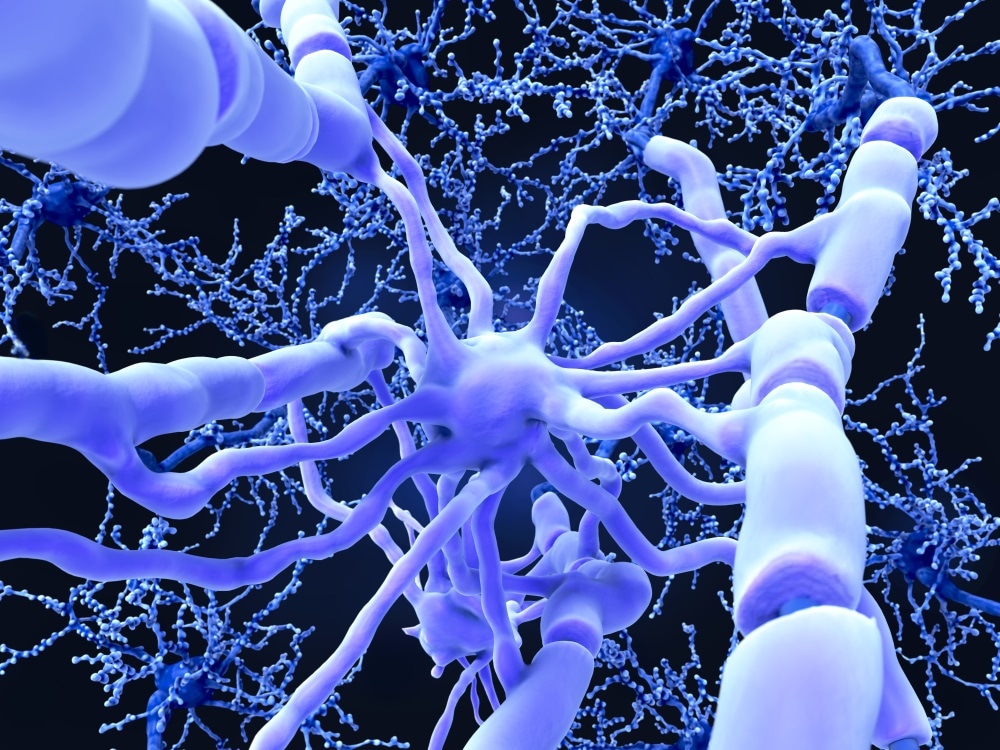Scientists at The University of Texas have discovered that myelin is not as metabolically inert as has previously been thought. A new study has revealed that the fatty substance that coats neural nerve cells is actually dynamic.
 Image Credits: Juan Gaertner / Shutterstock.com
Image Credits: Juan Gaertner / Shutterstock.com
The findings will influence the development of new therapies for illnesses affected by abnormalities in myelination, such as multiple sclerosis, and patients suffering from damage following chemotherapy drugs known as ‘chemobrain’.
The role of myelin in disease
Myelin is a substance made up of fatty substances and protein. It forms a sheath that coats nerves in the brain and spinal cord, allowing electrical impulses to transmit rapidly. In multiple sclerosis this substance is degraded, having the effect of slowing down these impulses. Chemotherapy can also cause temporary or permanent cognitive damage due to the impact of the drugs on the body’s myelin, leading to a condition known as ‘chemobrain’ which has been found to occur in as much as 70% of patients undergoing this kind of treatment.
This month, researchers at The University of Texas published the results of their new study in the Journal of Clinical Investigation which reveals new characteristics of myelin that were previously not known. The findings could help researchers design new and improved therapies for patients suffering from multiple sclerosis and ‘chemobrain’.
An opportunity to reverse demyelination
The team demonstrated that mature myelin is not metabolically inert, as has been assumed by scientists for decades, it is, in fact, incredibly dynamic. The substance’s lipid components, in particular, counteract the commonly held view that myelin is a very stable material. This finding is significant because mature myelin becomes degraded when patients with cancer undergo chemotherapy, an effect which is thought to be one of the most prominent manifestations of the neurotoxicity of the chemotherapy drugs.
The study uncovered that the lipids that form mature myelin go through a process of rapid turnover, where they rely on the QKI protein (an RNA-binding protein that plays a central role in myelinization) to maintain levels of myelin. When QKI proteins become depleted the result is rapid demyelination of the nerve cells, which generate deficits in neurological function.
The team used mice to demonstrate these effects. They showed that the QKI protein is vital for the regulation of peroxisome proliferator-activated receptors (PPAR), which serve as neural signaling proteins. In addition, PPAR work with retinoid X receptors (RXRs) to govern the transcription of their partners, a group of lipid metabolism genes.
QKI was shown to interact with PPAR-beta and RXR-alpha, a PPAR isoform, with the result of modulating transcription. This finding was key because it suggests a mechanism that could be targeted to treat the demyelination that is the cornerstone of multiple sclerosis and ‘chemobrain’.
Drugs that work as agonists to PPAR-beta and RXR-alpha were administered to the QKI-depleted mice. It was observed that these drugs were able to alleviate the neurological disabilities associated with demyelination. In addition, these drugs extended the mice’s survival durations.
Finally, the team investigated lesions from a patient who had primary progressive multiple sclerosis. In doing so, they found a subset of lesions that were characterized by downregulation of essential processes in lipid metabolism that were related with QKI and PPAR-beta/RXR-alpha.
Developing new treatments for multiple sclerosis and ‘chemobrain’
The takeaway message is that continuous lipid production is vital to maintain mature myelination of nerve cells within the central nervous system. The work emphasizes the role of lipid metabolism in multiple sclerosis and ‘chemobrain’ and provides an opportunity to develop new, more effective therapies for these conditions.
Source:
Study sheds light on fatty acid's role in 'chemobrain' and multiple sclerosis. Eurekalert. Available from: https://www.eurekalert.org/emb_releases/2020-03/uotm-ssl032020.php